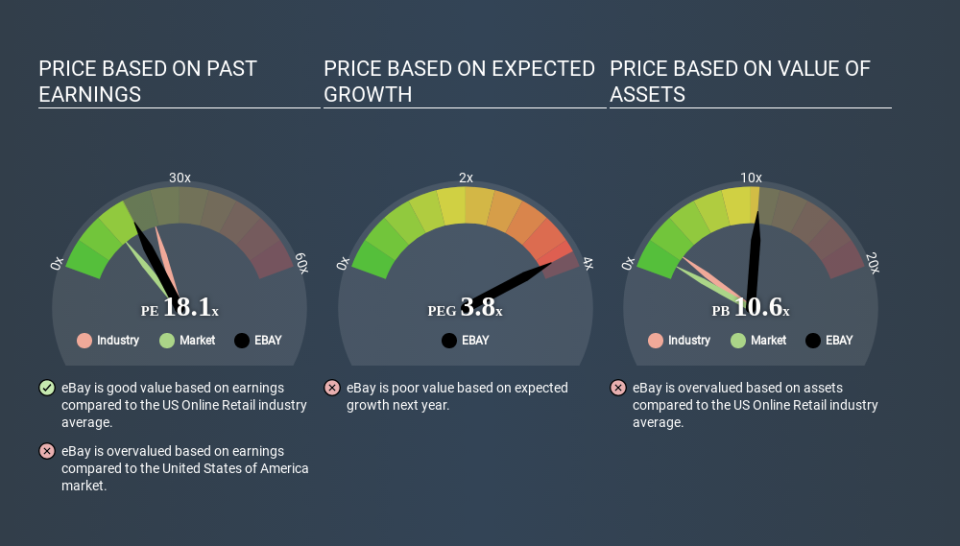What Is eBay's (NASDAQ:EBAY) P/E Ratio After Its Share Price Rocketed?

eBay (NASDAQ:EBAY) shareholders are no doubt pleased to see that the share price has had a great month, posting a 38% gain, recovering from prior weakness. Longer term shareholders are no doubt thankful for the recovery in the share price, since it's pretty much flat for the year, even after the recent pop.
All else being equal, a sharp share price increase should make a stock less attractive to potential investors. In the long term, share prices tend to follow earnings per share, but in the short term prices bounce around in response to short term factors (which are not always obvious). So some would prefer to hold off buying when there is a lot of optimism towards a stock. Perhaps the simplest way to get a read on investors' expectations of a business is to look at its Price to Earnings Ratio (PE Ratio). A high P/E ratio means that investors have a high expectation about future growth, while a low P/E ratio means they have low expectations about future growth.
View our latest analysis for eBay
How Does eBay's P/E Ratio Compare To Its Peers?
We can tell from its P/E ratio of 18.12 that sentiment around eBay isn't particularly high. The image below shows that eBay has a lower P/E than the average (23.0) P/E for companies in the online retail industry.
Its relatively low P/E ratio indicates that eBay shareholders think it will struggle to do as well as other companies in its industry classification. Since the market seems unimpressed with eBay, it's quite possible it could surprise on the upside. If you consider the stock interesting, further research is recommended. For example, I often monitor director buying and selling.
How Growth Rates Impact P/E Ratios
When earnings fall, the 'E' decreases, over time. That means unless the share price falls, the P/E will increase in a few years. So while a stock may look cheap based on past earnings, it could be expensive based on future earnings.
eBay shrunk earnings per share by 18% over the last year. And EPS is down 31% a year, over the last 3 years. This growth rate might warrant a low P/E ratio.
Don't Forget: The P/E Does Not Account For Debt or Bank Deposits
The 'Price' in P/E reflects the market capitalization of the company. That means it doesn't take debt or cash into account. The exact same company would hypothetically deserve a higher P/E ratio if it had a strong balance sheet, than if it had a weak one with lots of debt, because a cashed up company can spend on growth.
While growth expenditure doesn't always pay off, the point is that it is a good option to have; but one that the P/E ratio ignores.
So What Does eBay's Balance Sheet Tell Us?
eBay has net debt worth 16% of its market capitalization. It would probably deserve a higher P/E ratio if it was net cash, since it would have more options for growth.
The Verdict On eBay's P/E Ratio
eBay has a P/E of 18.1. That's higher than the average in its market, which is 13.3. With modest debt but no EPS growth in the last year, it's fair to say the P/E implies some optimism about future earnings, from the market. What we know for sure is that investors have become much more excited about eBay recently, since they have pushed its P/E ratio from 13.1 to 18.1 over the last month. For those who prefer to invest with the flow of momentum, that might mean it's time to put the stock on a watchlist, or research it. But the contrarian may see it as a missed opportunity.
Investors have an opportunity when market expectations about a stock are wrong. If the reality for a company is better than it expects, you can make money by buying and holding for the long term. So this free report on the analyst consensus forecasts could help you make a master move on this stock.
Of course you might be able to find a better stock than eBay. So you may wish to see this free collection of other companies that have grown earnings strongly.
If you spot an error that warrants correction, please contact the editor at editorial-team@simplywallst.com. This article by Simply Wall St is general in nature. It does not constitute a recommendation to buy or sell any stock, and does not take account of your objectives, or your financial situation. Simply Wall St has no position in the stocks mentioned.
We aim to bring you long-term focused research analysis driven by fundamental data. Note that our analysis may not factor in the latest price-sensitive company announcements or qualitative material. Thank you for reading.

